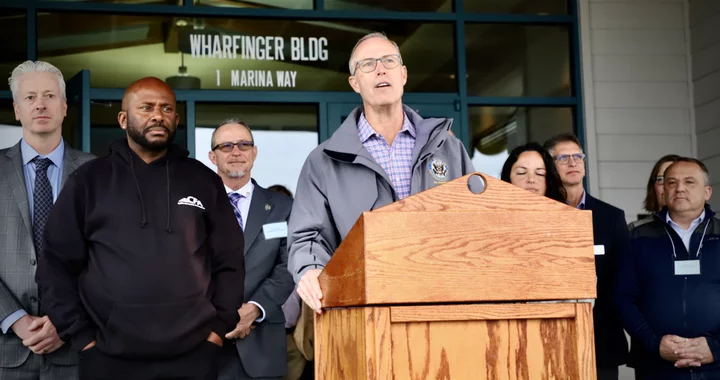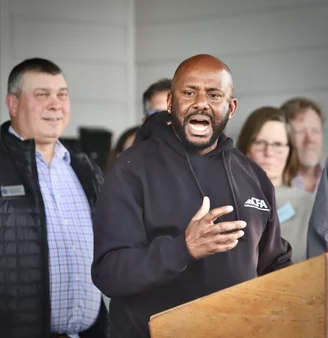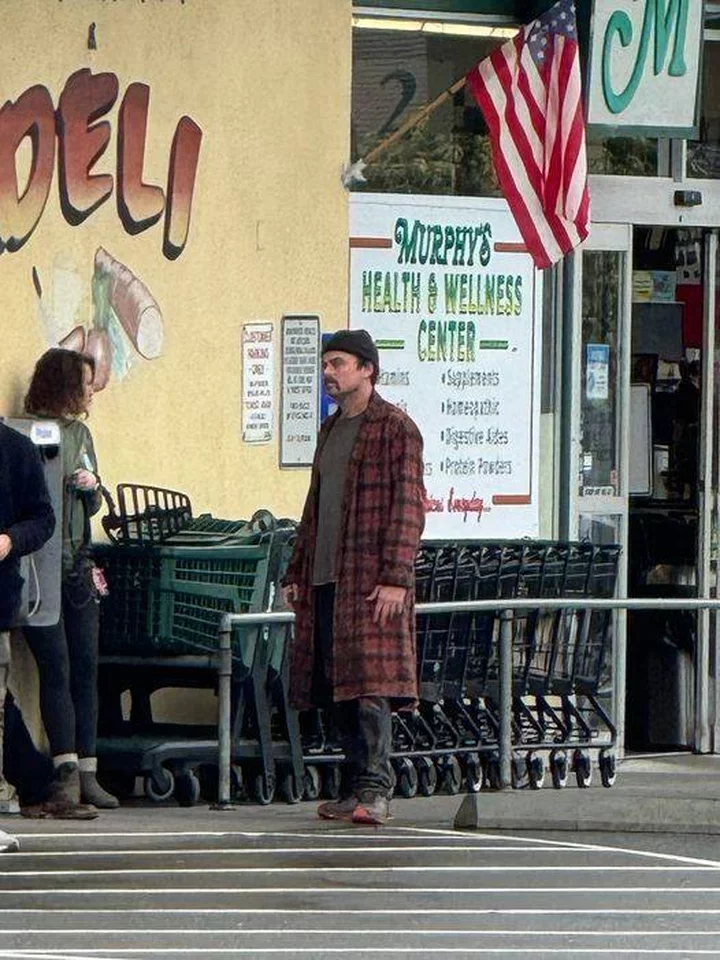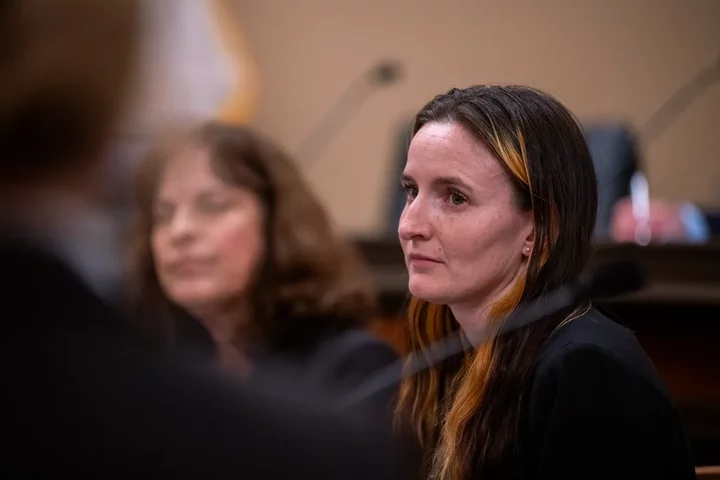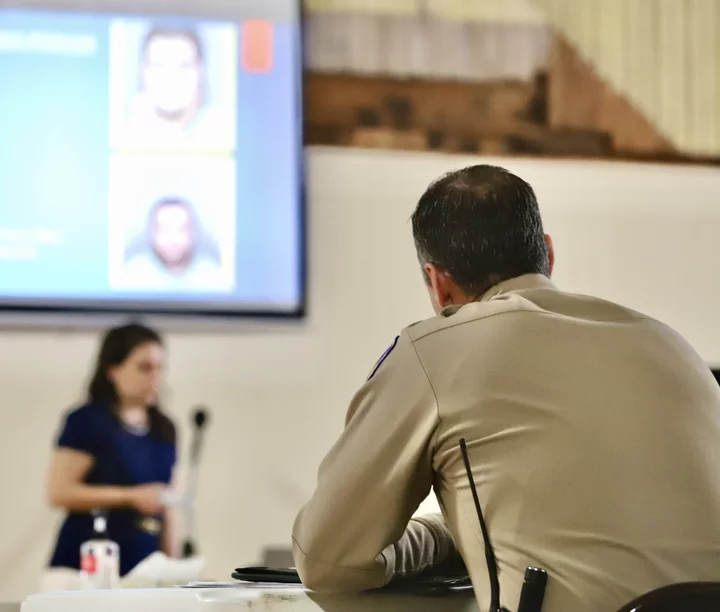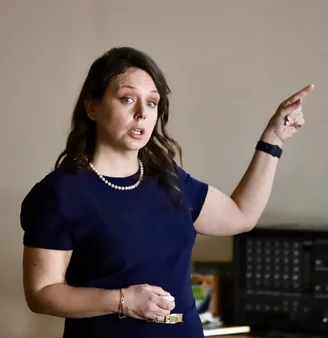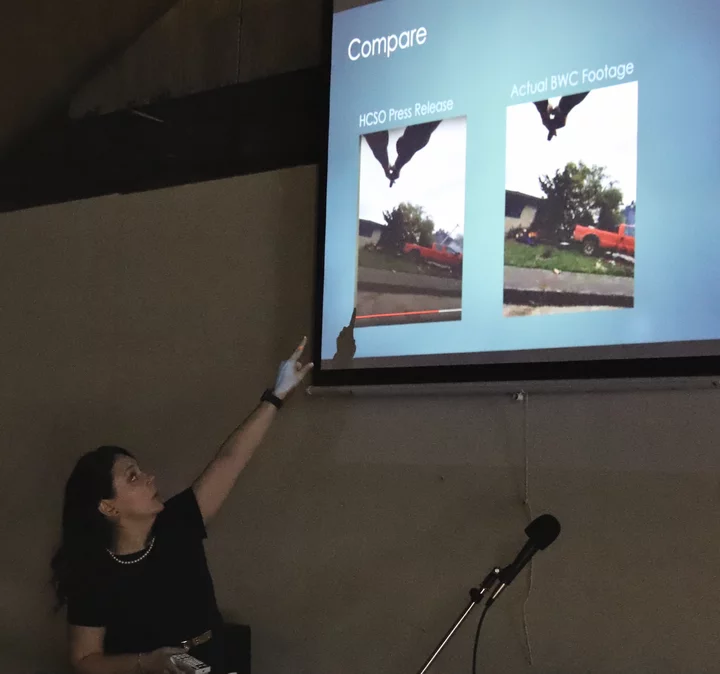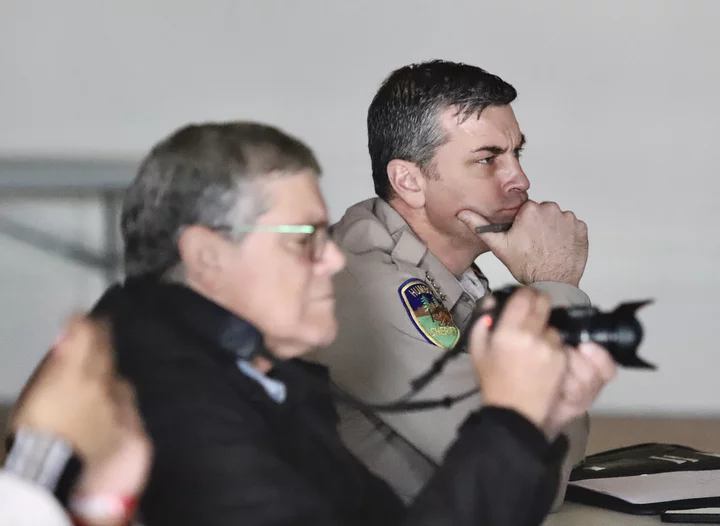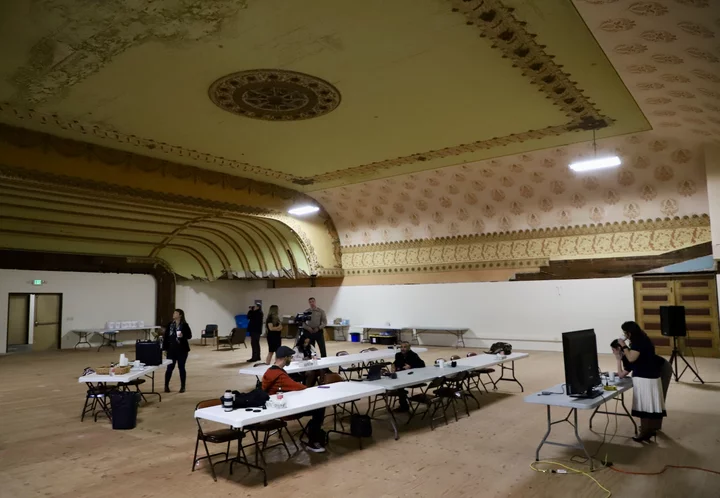After Meeting With Local Tribes, Congressman Huffman Doubles Down on Offshore Wind
Isabella Vanderheiden / Friday, March 29, 2024 @ 4:36 p.m. / Infrastructure , Offshore Wind
Congressman Jared Huffman (center) held a press conference at the Wharfinger Building in Eureka Friday to discuss the latest surrounding offshore wind development on the North Coast. Photos by Andrew Goff.
###
Offshore wind development efforts are full steam ahead here in Humboldt.
That was the message sent by Congressman Jared Huffman during a press conference at Eureka’s Wharfinger Building this morning. Surrounded by more than a dozen local, state and federal stakeholders, Huffman voiced his enthusiastic support for offshore wind and port development on the North Coast, touting the anticipated economic boon that comes with it.
“I’ve been representing this area for 12 years in the United States Congress and I have heard every manner of dream scheme plan to revitalize the economy,” he said. “None of it really holds together in a way that delivers the benefits and possibilities that this offshore wind project does. This [project] is incredibly responsive to the needs of this region, state and nation.”
Over the next decade, the Humboldt Bay Harbor, Recreation and Conservation District hopes to transform its Marine Terminal II property — formerly home to the Samoa pulp mill — into a state-of-the-art industrial site to support floating offshore wind farms all along the West Coast.
“As exciting as all those possibilities are, I think we’re also very clear-eyed that it’s not easy; it’s complicated,” Huffman said. “In some ways, we are creating an entirely new industry and … we want to help California – the fifth largest economy in the world – to meet these essential climate goals. This project is a very important part of that, and we want to do it in a way that honors our marine environment, that lifts up working people with good quality union jobs.”
And at the “front and center” are tribal values, Huffman said, acknowledging the recent surge in tribal opposition to offshore wind development on the West Coast.“We need to make sure that this works for Indian Country in a way that, historically, some economic opportunities have not. There’s a history of disappointment and exploitation, and we are determined to get this right for our tribal partners.”
As of this writing, five local tribal councils have adopted resolutions formally opposing the proposed offshore wind project, citing “grave concerns” about potential risks to marine ecosystems and the sustainability of industrial-scale renewable energy.
U.S. Secretary of the Interior Deb Haaland and Acting Secretary of Labor Julie Su visited the North Coast earlier this week to hear tribal concerns surrounding offshore wind. Asked to elaborate on the outcome of the discussions, Huffman said local tribal leaders “expressed a variety of views,” ranging from “enthusiasm” to “really grave concerns.”
“I think it was a frank exchange of views that are not a monolith,” he said. “I think that we did a lot of listening and heard them, but I didn’t hear anything that I believe is in any way insurmountable. I think we can realize all of the upside of this incredible opportunity while making it work for tribal nations in a way that previous waves of economic development have not. And I know that the intention to do that is here and it’s sincere.”
Huffman was joined by 65th District Assemblymember Mike Gipson, Chair of the Select Committee on Ports and Goods Movement, who discussed how the Port of Humboldt Bay fits into a greater “offshore wind industrial complex” slated for the West Coast.
“I have spent the last eight months touring all up and down California, touring our ports, meeting with surrounding communities and I must admit: Humboldt, you have been second to none,” Gipson said. “Your hospitality [and] your engagement far transcends this moment. … You lead the way in making [this] happen, and I believe others will follow.”
While out at dinner last night, Gipson said, he had the opportunity to speak with a few local folks about offshore wind development and the potential benefits of the project. “And they said, ‘We want jobs. Not only jobs – we want to make sure the people who live here get the jobs first,’” he said. “When I was a local leader of the [Carson] City Council, a big department store was coming to our city, and I said that I expect 85 percent of those jobs to be found for people who live in my community. How can I feed my neighbor’s kids, if my own kids are going hungry? … We hear you. We see you. We support you.”
Dozens of local, state and federal stakeholders attended this morning’s press conference, including Gov. Gavin Newsom’s Senior Advisor for Offshore Wind Jana Ganion, Director of Initiatives at Cal Poly Humboldt Connie Stewart, Humboldt County Supervisor Natalie Arroyo, Eureka Mayor Kim Bergel, harbor district and county personnel, representatives from the major international firms investing in offshore wind, among others.
###
CLARIFICATION: This article has been changed from its original version to include additional context from Asm. Gipson regarding local jobs.
###
PREVIOUSLY
- Harbor District Announces Massive Offshore Wind Partnership; Project Would Lead to an 86-Acre Redevelopment of Old Pulp Mill Site
- Offshore Wind is Coming to the North Coast. What’s in it For Humboldt?
- ‘Together We Can Shape Offshore Wind for The West Coast’: Local Officials, Huffman and Others Join Harbor District Officials in Celebrating Partnership Agreement With Crowley Wind Services
- Crowley — the Company That Wants to Build a Big Wind Energy Facility on the Peninsula — Will be Opening Offices in Eureka
- Harbor District to Host Public Meeting Kicking Off Environmental Review of Offshore Wind Heavy Lift Marine Terminal Project
- Humboldt Harbor District Officials Talk Port Development As Offshore Wind Efforts Ramp Up
- County of Humboldt, Developers Sign Memorandum of Agreement in a ‘Momentous Step Forward’ for Offshore Wind Development on the North Coast
- Harbor District Responds to Crowley Controversy, Commits to the ‘Highest Ethical Standards’
- LoCO Interview: The Outpost Talks to Crowley Executives About Recent Allegations of Misconduct, Port Development on the Samoa Peninsula and the Company’s Future in Humboldt
- Harbor District Board of Commissioners to Discuss Proposed Offshore Wind Terminal Project, Lease Agreement With Crowley During Tonight’s Meeting
- (UPDATE) Huffman Announces $8.7 Million Federal Grant Toward Offshore Wind Port Development
- Harbor District Commissioners to Discuss Extended Partnership Agreement with Crowley Wind Services During Tonight’s Meeting
- WHOA: Rep. Huffman’s Office Teases $426 Million Federal Grant for Offshore Wind Terminal, to be Announced Tomorrow
- (PHOTOS) The Biggest Federal Grant in Humboldt History? Huffman, Assorted Worthies Gather on Woodley Island to Celebrate $426 Million in Infrastructure Funding for Offshore Wind
- At a Two-Day Conference in Eureka This Week, North Coast Tribes Advocate for ‘Meaningful Engagement’ With Offshore Wind Developers, Federal Regulators
- Yurok Tribal Council Votes to Formally Oppose Floating Offshore Wind Energy Projects Along North Coast
- Bear River Tribal Council Joins Yurok in Formally Opposing Offshore Wind Development Along North Coast
- Trinidad Rancheria Becomes Latest Tribal Entity to Register Opposition to Offshore Wind
- Federal Officials, Developers Call for Collaboration with North Coast Tribes Amid Growing Opposition to Offshore Wind Development
BOOKED
Today: 5 felonies, 16 misdemeanors, 0 infractions
JUDGED
Humboldt County Superior Court Calendar: Today
CHP REPORTS
No current incidents
ELSEWHERE
County of Humboldt Meetings: Forestry Review Committee Agenda on Monday, December 15, 2025 at 1:00 pm
RHBB: 14th Street Closure in Eureka for Pavement Work December 11–12
RHBB: Air Ambulance Requested for Crash Near Covelo
Governor’s Office: Golden State at the Golden Globes, Film & Television Tax Credit awardees spotlight California’s Star Power
(VIDEO) HCSO Releases Body-Cam Footage From January Standoff With Man Who Allegedly Sliced Two Juveniles’ Necks With a Knife
LoCO Staff / Friday, March 29, 2024 @ 4:09 p.m. / Crime
###
Press release from the Humboldt County Sheriff’s Office:
On January 22, 2024, the Eureka Police Department responded to a report of a juvenile with a severe neck laceration allegedly caused by a family member, Daniel Martinez.
Martinez had barricaded himself with other occupants, including juveniles, in a residence on the 1400 block of Union Street, Eureka. EPD requested the Sheriff’s SWAT and Crisis Negotiators to the scene to assist with this critical incident. After several hours, negotiations led to the safe release of four hostages, one juvenile had a severe laceration to the neck.
All hostages were then treated for injuries and the juveniles were placed in the care of Child Welfare Services. Despite continued negotiations, Martinez refused to surrender and comply with commands. Martinez rapidly approached the law enforcement officers in a threatening manner with a large knife, leading to an officer-involved shooting. Martinez suffered mortal wounds and was pronounced dead a local hospital.
Pursuant to state law, the Humboldt County Sheriff’s Office is releasing body worn camera video, which captured the officer involved shooting. It should be known that all the deputies involved in the incident had cameras, however due to the length of the incident most of the batteries were depleted except for one deputy whose camera was operational during the incident. The images are at times hard to see, due to equipment and safety gear worn by the deputy and other law enforcement officers on scene.
A total of four videos will be seen. The first video is an adult female being rescued. The 2nd and 3rd video are 3 juveniles being released, one of which was injured by the suspect. The last video is the officer involved shooting. As a warning, some viewers may find this video disturbing and it is not suitable for children.
The Humboldt County Critical Incident Response Team (CIRT), led by the Eureka Police Department and the Humboldt County District Attorney’s Office, was activated to investigate this incident. Any further information related to this case should be directed to the Eureka Police Department.
The below linked video contains graphic images and explicit language that may be disturbing to some viewers. This video is not suitable for children. Viewer discretion advised.
https://youtu.be/z93pHyXIW5EREVIEW HCSO POLICIES: Humboldt County Sheriff’s Office Policy Manual
###
PREVIOUSLY:
Alas, We Have to Wait Until Summer 2025 to See Leo Dicaprio’s Locally Filmed Paul Thomas Anderson Movie
Ryan Burns / Friday, March 29, 2024 @ 3 p.m. / MOVIED!
Leo lookin’ scruffy at the Cutten Murphy’s Market. | File photo.
###
Well, my fellow film nerds, looks like we’ll have to wait nearly a year and a half to watch Leonardo DiCaprio’s Humboldt County adventures on the big screen.
Warner Bros. has announced a release date for the latest project from master filmmaker Paul Thomas Anderson (“Boogie Nights,” “Punch Drunk Love,” “There Will Be Blood”), and it’s NOT SOON ENOUGH, if you ask me: Aug. 8, 2025.
What will we do in the meantime? Keep collecting information tidbits that emerge from the hive mind of cyberspace, I suppose. Below are some such tidbits, divided into two categories: “probably reliable” and “unconfirmed rumors.”
PROBABLY RELIABLE:
- This will be the most expensive and most commercial movie of Anderson’s career thus far. With a reported budget of around $100 million, the project (still known only under the working title of “BC Project”) will be an “event film” summer blockbuster, with a dedicated release in IMAX theaters, of which Humboldt County has zero, unfortunately. The nearest ones are in Sacramento and the Bay Area.
- The multi-star cast includes DiCaprio, Sean Penn, Teyana Taylor, Alana Haim, Wood Harris and newcomer Chase Infiniti.
- Anderson is writing, directing and producing the film, his 10th feature.
- In addition to the confirmed Humboldt County locations (Cutten, outside Eureka High, Trinidad, Arcata), the production went on to film scenes in Sacramento County. A minor controversy flared up when a homeless encampment in Cesar Chavez Park was cleared to make way for filming. Other locations include Ronald Reagan’s former mansion in East Sacramento and the Fab 40s neighborhood, where a simulated explosion was shot. Anderson has said that other shooting locations will include Texas and Mexico.
UNCONFIRMED RUMORS:
- The plot. We still don’t know what this thing is about. While many signs point to it being an adaptation of Thomas Pynchon’s 1990 novel “Vineland,” other signs (including the contemporary setting) point elsewhere. The latest rumor, reported by movie gossip site World of Reel, is that Anderson is very loosely adapting “Vineland” while updating the book’s Reagan-era plot to set the events “in an alternate reality America” where hippies do battle with Trump/MAGA types, possibly even including batshit Republican congresswoman Marjorie Taylor Greene. Anderson previously adapted Pynchon’s novel “Inherent Vice.”
- Sean Penn’s character is rumored to be the head of a white supremacist group who’s out to eliminate an interracial child he had with Regina Hall’s character. In this rumor, DiCaprio plays the child’s adoptive father.
- The budget could be as high as $175 million — this according to World of Reel.
Anyone else have any tasty rumors? Let us know. Just 497 days left to speculate.
###
PREVIOUSLY
- Film Set to Shoot in Eureka is From Renowned Director Paul Thomas Anderson, With Leonardo DiCaprio, Sean Penn and Regina Hall, According to Industry Reports
- (PHOTOS) Hollywood Magic Transforms Cutten Plaza Into a Mexican Mini-Mall for DiCaprio Movie Production
- Northtown Arcata Will Be Swarming With Movie Folk Tomorrow, As Bigtime Production ‘BC Project’ Films in the Neighborhood
- (WATCH) First Look at Leonardo DiCaprio In Character for New Paul Thomas Anderson Film Currently Filming in Humboldt
- MOVIE DAY! My Diary of Hanging Around Waiting For The Stars to Show Up In Northtown, and the Things I Saw There
- Buh-Bye, Leo! Local Production on Paul Thomas Anderson’s New DiCaprio Movie Has Wrapped
Huffman Announces $1.4M in Federal Funding to Repair Storm Damage to Monument Road Near Rio Dell
LoCO Staff / Friday, March 29, 2024 @ 12:09 p.m. / Government , Transportation
###
Press release from Congressman Jared Huffman’s office:
Washington, D.C. – Today, U.S. Representative Jared Huffman (CA-02) announced that he secured $1,419,382.50 in federal funding to Humboldt County for roadway repairs as part of the Monument Road [Improvement] Project. Funds for this grant were awarded by the U.S. Department of Homeland Security’s Federal Emergency Management Agency (FEMA) and authorized under Section 428 of the Robert T. Stafford Act.
About the Project
In 2017, severe winter storms, flooding, and mudslides created an immediate threat to the public health and safety of the state of California. Due to heavy rains a subsidence of approximately 4-feet vertical, damaged 15 feet of the roadway width for a length of 225 feet.
Version 0 (V0) awarded $467,473.00 at 75% federal cost share = $350,604.75 on 4/14/2028 to install a 4,100 square feet (SF) mechanically stabilized embankment (MSE) wall, 2,278 cubic yard (CY) wire wall structure excavation, 1,974 CY imported borrow, 228 CY class 1 permeable base, 68 CY class 2 aggregate base, 410 square yard (SY) cold plane, 69 tons HMA, 205 linear feet (LF) 8” perforated plastic pipe underdrain, 15 LF 8” non-perforated plastic pipe, 205 LF metal beam guard railing (metal posts), and two terminal end section (type SRT). Version 1 (V1) was created for an improved project to install a soldier pile wall, instead of a MSE wall, and restore the public roadway to pre-disaster function and capacity.
Cost for the improved project will be based on the MSE wall; FEMA reviewed the costs associated with installing a MSE wall estimate and increased the approved amount of funding. No insurance proceeds are anticipated for this project. No mitigation has been identified or utilized for this project. Work to be Completed cost (WTBC) is based on the cost estimate format (CEF) developed by the Applicant. The costs V1 are $1,892,510.00 (CEF) funded at a 75% federal cost share = $1,419,382.50. Total project cost is $467,473.00 (V0) + 1,892,510.00 (V1) = $2,359,983.00 at 75% federal cost share = $1,769,987.25 less $350,604.75 (V0 Award) = $1,419,382.50.
California May Gut Two CalWORKS Programs Helping Thousands of Families
Justo Robles / Friday, March 29, 2024 @ 7 a.m. / Sacramento
Joy Perrin, a mother of two children, testifies at the Budget Subcommittee on Human Services hearing in Sacramento March 20, 2024. With the help of CalWORKS, Perrin was able to secure housing for her and her family. Photo by José Luis Villegas for CalMatters.
Joy Perrin had been living in a van with her two children for several months when she walked into a welfare office in 2018. She had left an abusive partner and had failed her first semester at Laney College in Oakland.
A social worker told Perrin she qualified for the CalWORKS family stabilization program, which provides cash assistance, transitional housing and counseling to families experiencing crises such as domestic violence, substance abuse, or the risk of homelessness.
Five years later, Perrin spoke to lawmakers on March 20, trying to save the program that helped her find a safe home and achieve an associate’s degree in biology.
“This program gave me the opportunity to show my children that poverty doesn’t have to be our name,” said Perrin, who plans to study radiology. “Not only am I a testament of the power of this program, but my children will be able to share their stories and how it can change their path to their future.”
“This program gave me the opportunity to show my children that poverty doesn’t have to be our name.”
— Joy Perrin, CalWORKS recipient
Because California faces a projected budget shortfall of $38 billion to $73 billion, Gov. Gavin Newsom in January proposed cuts that would wipe out funding for the family stabilization program and for another CalWORKS program that subsidizes jobs for low-income recipients.
Both cuts would undermine CalWORKS’ effectiveness, advocates say, and contradict the governor’s stated goals of helping move families out of poverty.
The family stabilization program serves more than 31,000 people. The extended subsidized employment program reaches about 8,000 participants a month. In total 354,000 households with 659,000 children receive CalWORKS benefits a year.
CalWORKS cuts
To shrink CalWORKS’ $7 billion annual budget, Newsom would take away what’s left of the $55 million from family stabilization this year and $71 million next year and $134 million each year from the expanded subsidized employment program — along with other cuts.
Some lawmakers are resisting.

Attendees watch the Budget Subcommittee on Human Services hearing at the state Capitol in Sacramento on March 20, 2024. Photo by José Luis Villegas for CalMatters
Assemblymember Corey Jackson, the Morena Valley Democrat who chairs the Assembly’s Human Services Committee, held the recent hearing to make clear how many people would be hurt.
He told CalMatters he opposes “a vast majority” of Newsom’s proposed cuts to CalWORKS and is seeking alternatives.
“The question is no longer whether something is a good program; the question is whether it is more important than another,” Jackson said. “CalWORKS is one of the most important programs that the state has. Very few can compete with it from a priorities perspective.”

Assemblymember Corey Jackson, chairperson of the Human Services Committee, at a hearing at the state Capitol on March 20, 2024. Photo by José Luis Villegas for CalMatters
State senators recently proposed shrinking the state budget shortfall by trimming current-year allocations. They agreed with Newsom’s plan to take back $336 million from CalWORKs, saying the money “is projected to be unexpended and should have no programmatic impact.”
But that doesn’t mean the cuts are set in stone. Newsom’s administration has proposed “a number of solutions across state government,” said H.D. Palmer, a spokesperson for Newsom’s finance department, including some funding for both CalWORKS programs.
The nonpartisan Legislative Analyst’s Office is also recommending reducing CalWORKS funding to reflect “consistently unspent funds,” said Sonia Russo, a policy analyst there. Almost $40 million a year remains unspent in the subsidized employment program, she said, though the family stabilization program spends all of its funds each year.
A family’s lifeline
Part of the federal Temporary Assistance for Needy Families program, generally known as welfare, CalWORKS requires recipients to get a job or participate in activities intended to lead to employment.
Its subsidized employment program helps people transition off public assistance by placing them into jobs and paying part of their wages.
At the height of the pandemic, the subsidized employment program’s caseload dropped, largely due to worksite closures and restrictions. But it began rebounding in 2021 and this year increased again, though still below pre-pandemic levels.

Lizbeth Paz Alegria at the Budget Subcommittee on Human Services hearing at the state Capitol in Sacramento on March 20, 2024. Photo by José Luis Villegas for CalMatters
Lizbet Paz Alegria, a program participant, said it’s a lifeline for many who need it.
Paz Alegria, a Mexican-born immigrant, sought CalWORKS help in 2022 because her husband at the time had lost his job. Bills were piling up and she and her three children needed to escape domestic violence, she said.
The subsidized employment program gave her a job at a San Mateo County resource center, where she helps other Spanish-speaking CalWORKS participants find employment.
“I was so grateful, because I was placed in a position to welcome families,” she told CalMatters, “and they see in me someone who has walked in their shoes, who knows that feeling of desperation.”
Paz Alegria is a permanent resident who immigrated more than two decades ago. Many other immigrants do not qualify for CalWORKS benefits because they are undocumented or have legal status but have lived fewer than five years in the U.S.
“I agree there must be cuts. The only question is where and whether we accomplish this through a just process.”
— Assemblymember Corey Jackson, Democrat from Morena Valley
CalWORKS bases its grants on the number of eligible family members in a household. The average cash grant was $1,021 a month last year, though families living in high-cost coastal counties, such as Los Angeles and San Francisco, received 5% more than families in inland counties, such as Shasta and Fresno.
In Fresno County, where poverty is nearly 19% higher than the rest of the state, more than 8,000 people received employment services from CalWORKS last year, said Maria Rodriguez-Lopez, the county’s deputy director of employment services.
The county contracts with the Marjaree Mason Center to help domestic violence victims. Last year the center handled 8,748 domestic violence cases, Rodriquez-Lopez said, and more than 500 people, including 257 children, participated in the family stabilization program.
“If funding is terminated, the risk of transitioning out of this contract is high,” Rodriguez-Lopez said. “However our department will make every attempt to mitigate the negative consequences to our families.”
A question of priorities
Jackson said the state has an obligation to prevent its vulnerable population from plunging further into a financial crisis. Last year California’s poverty rate grew from 11.7% in 2021 to 13.2%, with 5 million people living in poverty, according to the Public Policy Institute.
“I agree there must be cuts,” Jackson said. “The only question is where and whether we accomplish this through a just process.”
Jackson said he and other lawmakers have asked Assembly Speaker Robert Rivas to “not rush the process so people are not hurt due to political theater.”

Attendees at the Budget Subcommittee on Human Services hearing at the state Capitol in Sacramento on March 20, 2024. Photo by José Luis Villegas for CalMatters
Advocacy groups and nonprofits wrote a joint letter to legislative leaders predicting the cuts won’t save money but will instead cost the state: “Every $1 in CalWORKs received by a family saves the state $8 by preventing increases in child protective services, worsened children and parents’ health, and reductions in future education, employment and earnings,” it said.
State Sen. Scott Weiner, the San Francisco Democrat who chairs the Senate Budget Committee, said it will release a budget package later this spring. “Our goal will be to protect our progress for California and mitigate any impact on core program improvements of recent years, including CalWORKS.”
###
CalMatters.org is a nonprofit, nonpartisan media venture explaining California policies and politics.
OBITUARY: Tim Casey Sr., 1953-2024
LoCO Staff / Friday, March 29, 2024 @ 6:56 a.m. / Obits
Tim Casey Sr. was born in Scotia on June 29, 1953.
He lived his entire life in Hoopa, taking many adventures hitchhiking around California, Oregon and Washington.
He graduated from Hoopa High School in 1971.
After meeting his first wife Nina Mcghie in Washington State, they had two children, Tim Casey Jr. and Christopher Casey.
Tim met Marcy Westphal Hunter, his second wife, in 1985. They married in 1988. Marcy had one son, Christopher Hunter, who Tim raised as his own.
He loved his boys.
Tim had several careers in his lifetime — logger, carpenter, meat cutter at Ray’s in Hoopa. Tim finally landed his dream job during Hurricane Katrina where while working for the Natives, fire support crew. He was hired as a firefighter and engine driver in New Orleans, Louisiana.
He returned to Hoopa and was hired by the Hoopa Wildland Fire Department. After many years with Hoopa Wildland, he retired as captain in 2017.
After retirement, he felt he still needed to work and was hired by Torres Contracting in Salem, Oregon. Tim felt he had found the job he dreamed of his entire life. Tim finally had to quit firefighting due to his health.
Tim was preceded in death by his father, John Casey Sr, his mother, Cleo Rae Quinn, his stepfather Glen E.Quinn, sister, Joy Casey, brothers John Casey Jr. and Ben Casey, his sons Christopher Casey, and Timothy Casey Jr.
Tim leaves behind his wife Marcy, stepson Chris Hunter, brothers Dan Spiess and Chris Behymer, daughters-in-law Corie Casey and Angelique Ownbey, stepmother, Ethel “Tinkie” Garcia, sisters Anna Myers, Evonne Downs, and Kelly Casey. Grandchildren, Chris Hunter Jr. (CJ), Kiera Fitzpatrick Casey, Chloe Hunter, Cadence Casey, Cali Casey, Jaxon Casey, Drake Hunter, Skylar Hunter and Aliyah Hunter, nieces Natalie Casey, Amber Casey, Valerie Casey and Stephanie Goodwin, Ashley Mack, Allissa Williamson, and Katie Olsen, sister-in-law, Sandra Kagay, and brother-in-law Lloyd Douglass.
Many other family members, too numerous to name, but all very much loved and appreciated. Family bonds are strong in his family.
Tim had so many good close friends and many stories to tell. He loved hunting and fishing, traveling, but above all he loved his extended family, the community of Hoopa. He will always be remembered as “Big Guy and Big Lou.”
Tim passed from stage 4 pancreatic cancer on March 14 at home with Marcy, CJ and Chloe by his side. Tim was cremated and wanted his ashes spread along with both his sons at his favorite fishing hole, on the banks of the Trinity River in Hoopa.
Honorary Pall Bearers: Robbie Moon, Chris Hunter Jr., Loren Norton, George Moon, Harold Jones, Gary Jury, Richard Mitchell, JD Gerstner, Merwin Clark, Junior Moon, Ticmil Ashley, Brian McIntosh, Johnny Rodriques, Dayton O’Neil, Beau Goodwin, John Burr Rogers, Paul White, William Fraser, Raymond Vader, Paul Pack, Micheal Pack and Daniel Pack.
The family would like to thank everyone who came together to help make the family and Tim comfortable during his last weeks. We could not have done it without your support.
###
The obituary above was submitted on behalf of Tim Casey Sr.’s loved ones. The Lost Coast Outpost runs obituaries of Humboldt County residents at no charge. See guidelines here.
Attorney Accuses Sheriff’s Office of Excessive Force and Evidence Tampering in Officer-Involved Shooting Case; Honsal Disagrees
Ryan Burns / Thursday, March 28, 2024 @ 2:43 p.m. / Courts
Humboldt County Sheriff William Honsal watches as local attorney Andrea Sullivan delivers a presentation to reporters at a press conference held inside the former theater space of the Carson Block building. | Photos by Andrew Goff.
###
Local attorney Anakalia “Andrea” Sullivan today accused the Humboldt County Sheriff’s Office of evidence tampering and using excessive force in a case involving Brandon and Jesse Widmark, half brothers whose alleged crime spree last April culminated in an officer-involved shooting on the streets of Eureka.
The Widmark brothers, who were shot and seriously injured during their showdown with law enforcement, are facing numerous felony charges including hit-and-run, child endangerment and attempted murder of a peace officer.
Sullivan, who is representing the younger Widmark brother, 19-year-old Jesse, delivered a multimedia presentation that included publicly released body camera footage from last April’s incidents alongside “raw” footage she obtained from the Humboldt County District Attorney’s Office during the evidence discovery process preceding a preliminary hearing in the case.
The publicly released version of the footage in question starts around the 3:45 mark of the video embedded below:
Though nearly identical, the raw footage shown by Sullivan omits the blurring effects employed by the Sheriff’s Office to obscure Jesse Widmark’s face and the bloody wound in his leg.
Sullivan argued that by obscuring Jesse Widmark’s face, the Sheriff’s Office also obscured “the fact that he was prone on the ground with his hands in the air when law enforcement approached.”
She also highlighted the “near complete failure of the body-worn camera system,” noting that only one deputy turned his camera on during the incident, and that was by accident.
This one clip of video footage “only exists because the deputy that responded, [his] keys hit his phone and activated the body-worn camera system,” Sullivan said. “The deputies claim that my client was reaching for a weapon during this incident. Later, deputies testified that pursuant to HCSO policy and directions from the undersheriff, they were instructed not to prepare written reports.”
[ADDENDUM, March 29, 9:41 a.m.: Reached via email, Honsal provided this explanation:
Per our standard protocol, All deputies involved in the shooting, are interrogated by the CIRT investigators from EPD and the District Attorney. They provide complete voluntary statements in the interrogation which are transcribed and submitted into the investigation; thus a written statement is not necessary.
The CIRT investigation prepared by EPD and The Lead DA investigator was submitted to the District Attorney, and charges were filed based upon that information submitted. ]
Sullivan displays side-by-side still shots of body-worn camera footage.
While displaying a pair of video still shots side by side — the left version taken from the publicly released video and the right from the raw footage — Sullivan acknowledged that it’s unclear what the deputy is pointing his gun at, whether it’s her client’s prone body on the ground or his half brother Brandon, who is not clearly visible in either version of the video — or something else altogether.
But she said, “The deputies’ claim that my client was reaching for a weapon is contradicted by the raw body-worn camera footage.”
Following the press conference, Humboldt County Sheriff William Honsal said it’s standard practice for his office to blur faces and injuries in such publicly released videos, explaining that un-blurred footage is “not the graphic images we want out in this community.”
He also disputed the suggestion that any deputy fired at Jesse Widmark while he was on the ground with his hands up. By the time the video footage begins, Honsal said, Jesse Widmark had already been shot in the leg by Sgt. Conan Moore. Moore had approached the scene in an unmarked patrol vehicle and discharged his firearm from inside his truck after he saw that Widmarks engaged in a shootout with other deputies.
Sheriff Honsal takes in Sullivan’s presentation.
According to Honsal, the video footage comes from the body camera of Deputy Chad Crotty, who is shown holding Jesse Widmark at gunpoint while Sgt. Moore arrives and then fires multiple rounds at Brandon Widmark, who was armed with a rifle and “tucked behind the rear driver’s side tire” of the red Ford pickup truck they’d been driving.
Sullivan played the video footage during the press conference.
As the clip rolls, Deputy Crotty’s body-worn camera pans to the right, leaving Jesse Widmark out of frame as Moore can be seen (and heard) firing a volley of gunshots in the direction of the red pickup truck.
The Widmarks had been traveling that Ford F-250 during a high-speed chase through Eureka that ended with a violent collision in the intersection of Dolbeer and Harris streets. The crash injured three civilians in another vehicle, with one of them, a 27-year-old woman, suffering serious injuries.
Two passengers were inside the Widmarks’ F-250: a 37-year-old woman and a two-year-old child.
According to the sheriff’s office, both of the Widmarks were carrying rifles and fired at least one shot, striking a patrol vehicle. The half brothers were both shot multiple times and taken to a local hospital before being arrested when they were discharged.
I asked Sullivan if she’s arguing that the Humboldt County Sheriff’s Office blurred out certain spots of the footage to deliberately misrepresent the incidents.
She said that while she can’t speak to intent, she believes that this “material manipulation” of the footage “alters the tenor and tone of the video.”
“From the original press release video, it is not clear that Jesse Widmark clearly surrendered before law enforcement approached,” she added.
Standing outside the building afterward, Honsal disputed those allegations.
“Everything that she had to say today did not represent excessive use of force and did not represent evidence tampering whatsoever,” he said. “I think she misrepresented the facts of this case to push a narrative that she wants in this community.”
In an earlier statement emailed to the Outpost, Honsal noted that the District Attorney’s Office has filed charges against both of the Widmarks in a case that’s now headed toward a jury trial.
“I cannot speak for the District Attorney; however, I believe [her office] would not have filed this case if they found there was unlawful force used against Jesse and Brandon Widmark,” Honsal said.
A multi-agency Critical Incident Response Team (CIRT) led by the Eureka Police Department and the DA’s Office has conducted an investigation into the April 18 incidents, but Eureka City Manager Miles Slattery said the resulting report can’t be released to the public until the trial concludes.
Honsal, meanwhile, said his department’s deputies are victims in this case and also heroes.
“They stopped a crime spree that day,” he said. “And if [the Widmarks] didn’t get in that collision on Dolbeer and Harris — and I feel very bad for the community member that got struck; it was an absolute tragedy — but they were aiming right towards a hospital. They were going right towards a preschool. Who knows what would have happened if they would have stopped in front of preschool [or] if they would have ran into the hospital with two rifles?”
As for why only one officer had his body camera turned on, Honsal said that this model of camera was new at the time and deputies weren’t used to activating them.
“In this dynamic situation, they didn’t activate them because it wasn’t muscle memory at that point in time,” he said. “We have since made sure that deputies are following up with this to make sure that they are activating their body-worn cameras on every incident where it’s required by law. It’s our policy that they do so.”
Regarding the Widmarks incidents, Honsal said his deputies gave the them several opportunities to surrender and used “the reasonable amount of force necessary to overcome their resistance.”
The press conference was held inside the former theater space of the Carson Block building.
###
PREVIOUSLY:
- “Going Down,” April 18.
- (LIVE) Sheriff’s Office Press Conference About Yesterday’s Police Shooting on Harris Avenue
- Sheriff’s Office Issues Statement on Harris Street Incident, With Clear Photos of the Suspects and Weapons Recovered
- Eureka Police Officially Arrest One Suspect in April Assault, Police Chase That Resulted in Harris Street Shootout
- Finally Released From Hospital, Second Suspect in April Police Shootout in Eureka Arrested, Charged With Attempted Murder of Officer
- [VIDEO] Sheriff’s Office Releases Security and Body Cam Footage of April Deputy-Involved Shooting in Eureka

